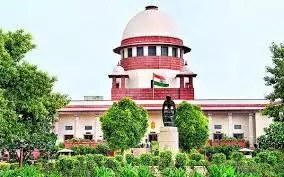CJI Gavai on Waqf Act: Courts Can’t Intervene Unless Glaring Unconstitutionality Is Proven

Chief Justice of India BR Gavai on Tuesday emphasized that laws passed by Parliament are presumed to be constitutional, and courts can only step in when there is a clear violation. His comments came during a Supreme Court hearing on multiple petitions challenging the recently enacted Waqf Amendment Act.
A bench comprising CJI Gavai and Justice AG Masih was hearing arguments against the Act, which was passed into law last month. The court had earlier narrowed the focus of the case to three core issues: the concept of Waqf by user, the inclusion of non-Muslims on Waqf Boards and the Central Waqf Council, and the designation of government land as Waqf property. The central government had previously assured the court that it would not act on these provisions until the matter was resolved.
Solicitor General Seeks Focused Arguments
During the hearing, Solicitor General Tushar Mehta told the court that the Centre had filed its responses on the three identified issues. He urged the petitioners to restrict their arguments to those areas. “The written submissions now raise several other issues. My request is to confine the hearing to the three points flagged earlier,” he said.
However, senior advocates Kapil Sibal and Abhishek Manu Singhvi, representing the petitioners, opposed narrowing the scope. “This can’t be a piecemeal hearing,” Singhvi argued, referring to an earlier statement by then-CJI Sanjiv Khanna that the court would examine the full matter and consider interim relief if necessary.
Sibal Slams Act as Tool to Seize Property
Kapil Sibal strongly criticized the Waqf Amendment Act, calling it a mechanism designed to take control of Waqf properties without due process. “The law is structured in a way that allows Waqf lands to be taken away arbitrarily,” he said.
One of his key concerns was a provision requiring that only a person who has been a practising Muslim for at least five years can create a Waqf. “If I’m on my deathbed and want to donate my property as Waqf, I have to prove I’ve been practising Islam for five years — that’s unconstitutional,” Sibal argued.
He also pointed to another provision that allows local panchayats or private citizens to challenge Waqf status. “A government officer can decide the fate of the property — becoming judge in his own cause. That raises serious concerns,” he added.
CJI Reiterates Court’s Limits
Responding to Sibal’s arguments, Chief Justice Gavai underlined the principle of constitutional presumption. “There is a presumption of constitutionality in laws passed by Parliament. Courts cannot interfere unless a glaring case is made out. Especially in the present context, we don’t need to say more,” he said.
Sibal pushed back, stating that the law effectively allows the State to strip ownership of personal property. “Waqf is about private property — not State land. Now that very property can be taken away without any proper process,” he said.
The hearing will continue as the court weighs the constitutional challenges raised by the petitioners.
